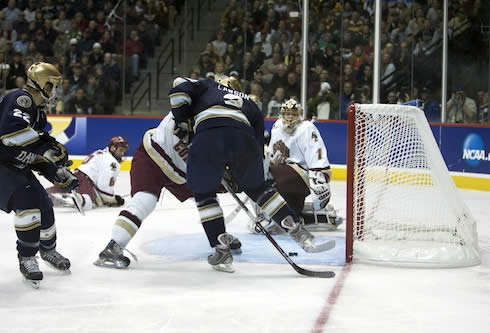The Frozen Four may be in the books for another year, but the most controversial play of the tournament, a Notre Dame goal in the third period of the championship game that was overturned by video replay, is still being debated throughout college hockey.
They play, which occurred at 4:56 of the third period with Notre Dame trailing, 3-1, would have closed the BC lead to a single goal. Instead, 35 seconds later Ben Smith scored to give BC a 4-1 lead, which is how the game ended.
The debate on the play was whether or not Notre Dame’s Kyle Lawson kicked the puck into the net. It was clear that the puck hit both of his skates, which he angled in an attempt to move the puck forward to his stick. But after the puck hit his skates, it never did touch his stick before crossing the goal line.
According to Ty Halpin, the NCAA’s associate director of playing rules administration and the staff liaison to the ice hockey rules committee, whether Lawson was attempting to kick the puck in the net was not completely relevant due to a clarification of “distinct kicking motion” that was put into place prior to the 2007-08 season.
“The committee defined a distinct kicking motion this summer as the skate moving toward the goal,” said Halpin via email. “The puck clearly touched [Lawson’s] right skate, which was moving toward the goal, causing the puck to enter the goal.
“[Video replay official] Greg Shepherd and the entire officiating crew used every possible angle available to determine whether or not the puck touched the Notre Dame player’s stick before entering the goal. In the end, the correct call was made.”
Truth is, had this game been played a year ago, this goal might have been allowed.
Prior to the 2006-07 season, the rules committee tweaked the definition of the rules to allow for athletic moves to be used to redirect pucks using a skate. In other words, players were allowed to turn or angle their skates — similar to how a soccer player might turn his foot — to redirect the puck into the net.
That interpretation lasted just one season, and in the last off-season was changed to reflect the committee’s above interpretation. If you’re looking through the NCAA rules book for this new interpretation, though, you won’t find it. The rule book is published on a two-year cycle and on the off year, as was the case this year, a memo clarifying rule interpretations and changes is issued to coaches, commissioners and supervisors of officials.

Here is the excerpt from this year’s memo referencing the distinct kicking motion:
“8. Interpretation of a Distinct Kicking Motion. The group had considerable discussion on the difference between directing, deflecting and kicking a puck into the goal. Again, the rules have not changed for 2007-08, but several officials and coaches have different interpretations of how this rule should be adjudicated.
To assist with this, the committee approved the following definition of a distinct kicking motion: ‘A distinct kicking motion is defined as the skate moving toward the goal line.’
This interpretation does not alter any wording that is currently in the rules book, but it is the group’s hope that adding this language in the future will assist officials, coaches and players to understand this rule.”
So while this play may still seem controversial to some, Halpin’s explanation of Shepherd’s ruling appears to be consistent with the rules committee memo.


